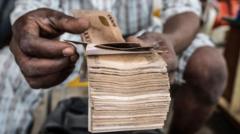This website uses cookies so that we can provide you with the best user experience possible. Cookie information is stored in your browser and performs functions such as recognising you when you return to our website and helping our team to understand which sections of the website you find most interesting and useful.


A fundamental part of a wedding celebration for many Nigerians is under threat.
The moment is always eagerly anticipated.
The bride and groom start dancing and the guests step forward brandishing large wads of cash.
As the band plays, they start flinging – or, as it is referred to here, “spraying” – the money, one note at a time, in the air and at the happy couple.
The cash spins to the ground and once scooped up, it can be used by the newlyweds to buy a present or towards paying for the party.
“I can’t imagine attending an event and not spraying money. It will look as if you don’t appreciate and love those celebrating,” one guest at a recent wedding in the northern Nigerian city of Kano tells the BBC.
The groom at that wedding, who would only talk to the BBC on condition of anonymity as he now fears getting into trouble, says he continues to look at the videos and pictures of the spraying “because I loved it”.
The problem is that the authorities have started to crack down on spraying money. Some prominent personalities have even been sent to prison.
It may appear to be an ostentatious yet essentially innocuous act but in Nigeria this much-loved institution is a crime: the abuse of the country’s currency, the naira.
The 2007 Central Bank of Nigeria Act is unambiguous. “For the avoidance of doubt,” it says, “spraying of, dancing or [marching] on the naira or any note issued by the Bank during social occasions or otherwise howsoever shall constitute an abuse”.
The punishment is no less than six months in prison or a 50,000 naira fine ($36; £29), or both. The fine was set in 2007 and the figure has not been adjusted for inflation.
On the statute books for 17 years, this clause was largely ignored until recently when the elite anti-crime agency, the Economic and Financial Crimes Commission (EFCC), said it was leading a drive against "all forms of naira abuse".
Officials have said that spraying naira shows a lack of respect to one of the country's most important symbols.
Some analysts say that the recently appointed EFCC boss, Ola Olukoyede, has been trying to make a name for himself through this clampdown.
In February, actress Oluwadarasimi Omoseyin was sentenced to six months for spraying and stepping on new naira notes.
Last month, one of Nigeria's most popular celebrities, a transgender woman known as Bobrisky pleaded guilty to four counts of abusing the currency and is currently serving her sentence.
Bobrisky was seen in videos spraying notes in the air in a sign of appreciation at various social events.



 Africana55 Radio
Africana55 Radio 
